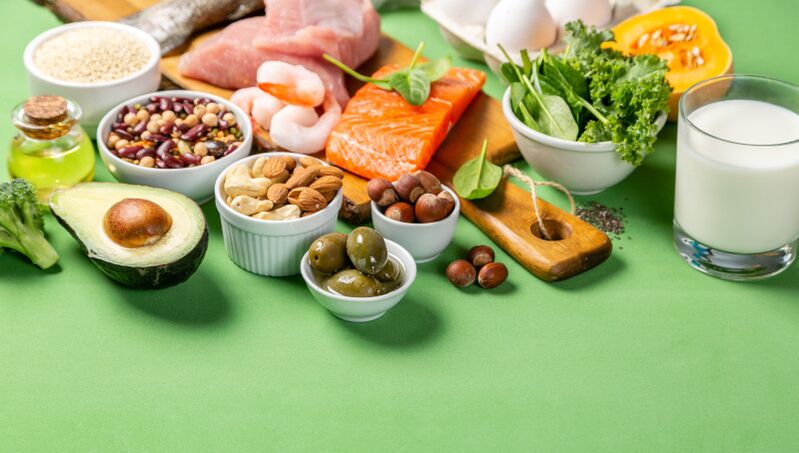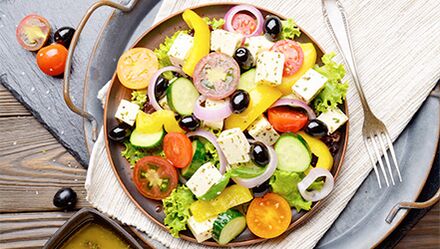Diet for longevity

The term "Mediterranean diet" was first introduced to the world by American nutritionists Ansel and Margaret Keys, who have been eating according to the principles of the Mediterranean diet since the 1940s and lived no less than 97 and 100 years. This is the only diet in the world thatIt received UNESCO Intangible Cultural Heritage status in 2013. Today, the Mediterranean diet is particularly popular among celebrities such as Victoria Beckham, Cameron Diaz, Eva Longoria and Jennifer Aniston.
There is only one drawback - you have to follow this approach to healthy eating throughout your life, but despite this, since the mid-1990s, the diet has been gaining more and more fans.
Why "Mediterranean"? Studies have shown that the attractive figure, longevity and good health of residents of Greece, North-Eastern Spain, Italy, Portugal, Southern France and other countries of the Mediterranean region are directly dependent on how they approach healthy eating.
Basic principles of diet
The carbohydrate, protein and fat content of the diet is 60%, 10% and 30%, respectively. But the main secret is that the fats and carbohydrates in the weight loss diet should be adequate. Namely, durum wheat pasta, legumes and a variety of whole grain breads. Also olive oil, avocado, fatty fish. Add a salad of fresh vegetables and herbs - and you have a healthy lunch on the table.
At the same time, there are no strict restrictions or methods, since the main principle of the system is to divide products into:
- included in the daily diet;
- consumed 1-4 times a week;
- allowed no more than 1-2 times a month.
Foliage
Each country has its own preferences for greens, but there are many on the table.
Thus, the Greeks use lettuce leaves as "green pita bread", wrapping vegetables, meats and cereals in them. Horta is a popular snack - a mixture of herbs with butter or lightly fried.
The love of spinach comes from France, its neutral taste allows the greens to be used as a main dish and as a filling in all kinds of culinary delights.
And Italians love broccoli, and the healthiest part of it is its leaves, which are eaten raw, with the spicy taste balanced by tomatoes and cheese, fried and seasoned with balsamic vinegar.
Dairy product
Dairy products continue to be popular in Mediterranean countries. When used correctly, animal milk is a source of calcium, vitamin D, protein and amino acids. And if France is a fan of mature and aged cheeses, then Greece is a real lover of yogurt. There, it is served with salads, meats, breads and as an independent dish, with or without fruit and herbs.
In the first line of the advantages of cheese, we find the following:
- Diet goat cheese, which is low in calories, but rich in B vitamins and microelements, as well as easily digestible proteins.
- Feta made from sheep's or goat's milk helps regulate blood pressure, calms the nervous system and strengthens bones.
- Spicy Parmesan plays a leading role in the content of proteins, vitamins and amino acids.
- Silky provolone is also enriched with enzymes that are useful for humans, giving it an unusual taste.
Vegetables
The variety of salads on the menu is quite expected in Mediterranean countries. Nutritionists have always emphasized the need for plenty of vegetables in the daily diet. This helps improve digestion and heart function. Fresh vegetables with minimal processing, olive oil, spicy herbs. . . And on your table is the source of vitamins, organic acids, carbohydrates, proteins and fats - everything your body needs. Add a few slices of feta - this is what an authentic Greek salad looks like, a characteristic of Mediterranean cuisine.
Meat and fish
If we analyze the ratio of meat and fish dishes, despite such delicacies as Parma ham from Italy or jamon from Spain, fish and seafood still dominate. Red meat is rarely on the menu, because you can get the maximum amount of saturated fatty acids, vitamins and microelements from seafood.
Fats
An important feature of the Mediterranean diet is the reduction of saturated animal fats in favor of healthier vegetable oils and unsaturated fats. Vegetable oils are olive oil, nuts, seeds. Fatty fish that contain most omega-3 polyunsaturated fatty acids have a predominance of unsaturated fats. It helps maintain the balance of vitamins and microelements in the body, and the bonus will be elastic skin and shiny hair.

Olive oil
Olive oil occupies a special place in the Mediterranean diet menu. A few tablespoons of oil a day is essential in this unique approach to healthy eating. Don't be alarmed - some nutritionists recommend eating 60 grams of breakfast per day. soaked bread 40 gr. olive oil. This is not surprising, since the fats in olive oil are similar to the fats in breast milk, so it is recommended to start incorporating vegetable oils into complementary foods. For an adult gourmet, olive oil improves bone mineralization, improves digestion and stabilizes blood pressure. Olive oil contains oleic acid (up to 70% by volume). Omega-9 is an unsaturated fatty acid and acts as a powerful natural antioxidant. As a result, the metabolism improves and the aging process slows down. Olive oil also contains a lot of vitamins E and K, which improve immunity and regulate the body's energy processes.
You also need to understand that not all olive oils are made according to the rules. Many unscrupulous manufacturers flood the market with low-quality and counterfeit products. These oils can be improperly extracted and processed, which destroys delicate nutrients, and some fatty acids can become rancid or toxic. Therefore, choose only high-quality oil, marked on the label
Spices, seasonings, aromatic oils
Mediterranean cuisine is particularly rich in aromatic oils, herbs and spices. You can easily prepare it yourself at home - garlic oil harmoniously decorates pasta and sauces, mint oil emphasizes the freshness of salads, and lemon oil makes fish dishes more refined. At the same time, salt consumption is significantly reduced, which also explains the healing effect on the cardiovascular system and the entire body. Feel free to use spices and seasonings in your recipes, experiment with combinations and dosages.
red wine
The diet also has a spicy quality - red wine is encouraged, although moderate alcohol consumption is emphasized. 10-50 ml per day is enough to improve heart function, clean blood vessels and have a good mood.
The benefits of the Mediterranean diet
The products for this diet are minimally processed and without additional refined sugar. These include olive oil, vegetables and fruits, legumes, nuts, durum whole grains, and small portions of animal products that are necessarily "organic" and not shelf-stable. There are virtually no GMOs, artificial ingredients, preservatives, flavor enhancers andvery little sugar For desserts, Mediterranean people use fruit or light homemade desserts using natural sweeteners such as honey.
The animal component of the diet is the moderate consumption of cow's, goat's or sheep's cheese and yogurts, as well as a lot of locally caught fish. It is a source of omega-3 fatty acids and other healthy fats, the "good" cholesterol that strengthens the walls of blood vessels.
Improving the cardiovascular system High intakes of monounsaturated fats and omega-3 foods are associated with significant reductions in all-cause mortality, especially from heart disease. Numerous studies have shown the positive effects of a Mediterranean diet rich in alpha-linolenic acid (ALA) from olive oil, including a 30 percent reduction in the risk of death from cardiovascular disease and a 45 percent reduction in acute heart failure.
Warwick Medical School also found that those who regularly consumed extra virgin olive oil experienced a greater reduction in blood pressure than those who consumed predominantly sunflower oil.
In addition, it is extremely rare for Mediterranean people to have low "good" cholesterol levels because they usually get a lot of healthy fats from their natural diet.
Lose weight the healthy way With this diet, you can eat very varied and tasty foods without feeling hungry. Therefore, you can follow this diet for a long time without failure, controlling your weight and reducing fat intake, easily and naturally. In the Mediterranean diet, it is possible to vary, either by increasing the amount of carbohydrates, or by emphasizing high-quality protein products of animal and mainly plant origin. In any case, this eating style helps control weight gain, control blood sugar levels, improves mood and keeps energy levels high.
Cancer prevention According to researchers at the Department of Surgery at the University of Genoa in Italy, a balanced ratio of omega-6 and omega-3 essential fatty acids, high fiber content, antioxidants and polyphenols found in fruits, vegetables, olive oil and wine provide protection. It protects DNA from damage and stops cell mutation, reduces inflammatory processes and delays tumor growth. Olive oil also reduces the risk of colorectal cancer.
Treatment and prevention of diabetes The Mediterranean diet controls excess insulin, the hormone that regulates blood sugar levels, which causes weight gain, and keeps our weight off even when dieting.
There is a lot of evidence that the Mediterranean diet can serve as an anti-inflammatory diet that can help fight diseases associated with chronic inflammation, including metabolic syndrome.
A diet low in sugar and high in fresh food and fat is part of a natural lifestyle for people with diabetes.
The Mediterranean eating style helps prevent blood sugar spikes and valleys. Carbohydrates - in the form of wholemeal bread or pasta made from durum wheat, often combined with olive oil or cheeses, and plenty of greens and vegetables - are an excellent source of energy for several hours without significant sugar spikes and early hunger.
Protecting cognitive health and promoting good mood Healthy fats such as olive oil and nuts are known to help fight age-related cognitive decline. They can counteract the harmful effects of toxicity, free radicals, a poor inflammatory diet, or food allergies that can contribute to brain dysfunction. Cognitive impairment can occur when the brain does not get enough dopamine, an important chemical for proper exercise, mood regulation, and mental functioning.
Probiotic foods, such as yogurt and kefir, promote healthy gastrointestinal function, which has been linked to cognitive function.
Thus, the Mediterranean eating style can be a natural treatment and prevention for Parkinson's disease, Alzheimer's disease and age-related dementia.
Promotes longevity Back in 1988, a study in Lyon asked heart attack patients to either follow a Mediterranean diet rich in monounsaturated fats or a standard diet that significantly reduced saturated fats. Four years after the study began, the results of a follow-up study showed that patients in the first group were 70% less likely to have heart disease and 45% less likely to die from any cause than the standard diet group. At the same time, there was no big difference in total cholesterol levels, which proves that there is no direct link to heart disease. The results were so impressive and groundbreaking that the study was stopped early for ethical reasons so that all participants could continue to follow a Mediterranean diet for maximum health and longevity.
It helps to relieve stress and relax Chronic stress significantly reduces the quality of life and negatively affects weight and general health. The Mediterranean diet encourages you to spend more time in nature and get a good night's sleep. This is a great way to relieve stress and thus prevent inflammation. And more - there is more time to laugh, dance, relax and engage in hobbies.
Fights depression According to a study published in the Journal of Molecular Psychiatry in 2018, the Mediterranean diet reduces the likelihood of depression. Inflammation is often cited as a root cause of many disorders and psychiatric conditions, including schizophrenia, obsessive-compulsive disorder, depression, anxiety, fatigue, and social withdrawal. A nutrient-rich diet, on the contrary, helps protect the brain from organic and functional changes. Other changes in diet and lifestyle, such as getting enough sleep, paying attention to what you eat, choosing your menu in advance, and limiting stress lead to stable mental health.




What is possible and how often
If you decide to try this popular and in many ways unique food system, the following products should be on your table every day from now on:
- Fresh fruits (apples, bananas, pears, citrus fruits, figs, peaches, apricots, berries, melons, watermelons);
- Vegetables (primarily non-starchy, such as tomatoes, eggplant, artichokes, all kinds of cabbage), greens (especially leafy - spinach, lettuce);
- Whole grain products (brown rice, rye, barley, corn, buckwheat, whole oats, wheat and their products - bread and pasta);
- Legumes and beans (lentils, chickpeas, beans, peas, peanuts);
- Root vegetables (yamk - sweet potatoes, turnips, yams, parsnips, chicory);
- Nuts and seeds (walnuts, almonds, hazelnuts, macadamia nuts, cashews, sesame seeds, sunflower seeds, pumpkin seeds);
- Spices and herbs (garlic, nutmeg, cinnamon, pepper, basil, mint, rosemary, sage) make it possible to minimize the amount of salt in the diet;
- Vegetable fats (olive oil, pure avocado and oil from it);
- About 2 liters of pure water, tea or coffee per day is allowed, but sweetened drinks and fruit juices should be avoided;
- Dairy products - cheese, yogurt or kefir - in moderation;
- Red wine in moderation (but this is completely optional).
Every week you need:
- Fish and seafood (give preference to wild fish species over artificially farmed ones), shrimp, oysters, mussels, clams, crabs - at least 4 times a week;
- Eggs - in moderation, 2-4 times a week;
- Potatoes - in moderation;
- Some sweets.
Every month you can eat:
- Red meat;
- Poultry (chicken, duck, turkey) and lean meat (rabbit, ham, pork fillet).
The following should be avoided in the diet:
- Refined sugar and products containing it (ice cream, candies, drinks, table sugar);
- Highly processed grains (white bread, soft wheat pasta, polished grains);
- Trans fats (margarines and products containing them);
- Refined oils (all types, including soybean, canola, cottonseed);
- Processed meat products (sausages, sausages, semi-finished products);
- Products with additional processing or enrichment (labeled "low-fat", "enriched", "refined").
Menu for the week
A huge advantage of the Mediterranean nutrition system, but also a disadvantage, is the lack of strict rules and a clear nutrition plan. To help you navigate, here is the weekly menu adapted to the food basket of our ribbon.
Monday
- Breakfast - yogurt with cereal and berries.
- Lunch - cabbage soup and roast meat.
- Dinner - vegetable salad with eggs, olive oil and lemon juice.
- Snack - fruit salad from seasonal fruits, a handful of nuts.
Tuesday
- Breakfast - oatmeal with flax seeds, honey and banana slices.
- Lunch - lasagna with vegetables.
- Dinner - fried eggplant with feta cheese and a cheese sandwich.
- Snacks – probiotic yogurt, grapes and popcorn.
Wednesday
- Breakfast - berry pudding with Greek yogurt and chia seeds.
- Lunch - whole grain sandwich with vegetables.
- Dinner: Grilled salmon served with brown rice and vegetables.
- Snacks - roasted pumpkin seeds, celery with peanut butter.
Thursday
- Breakfast - omelet with tomatoes, bell peppers, onions, broccoli and feta cheese.
- Lunch - pureed spinach soup with sour cream, sour cream or Greek yogurt, baked potatoes.
- Dinner - shrimp salad with olive oil.
- Snack - selected tropical fruits, carrots with hummus.
Friday
- Breakfast - oatmeal with dried fruits and nuts.
- Lunch - vegetable soup with chicken soup.
- Dinner - fried or fried fish.
- Snacks – kale or zucchini chips, olives.
Saturday
- Breakfast - Sweet potato casserole with spinach and cheese.
- Lunch - Mediterranean whole wheat pizza with cheese, vegetables and olives.
- Dinner - salmon with buckwheat, cabbage salad.
- Snack - fruits, cottage cheese with dried fruits.
Sunday
- Breakfast - yogurt with bifidobacteria, chopped fruits and nuts.
- Lunch - tuna salad with olive oil.
- Dinner - Greek salad with cucumber, tomato, black olives, spinach, feta cheese, smeared with olive oil, a piece of lean steak.
- Snack - selected nuts, fruit salad.
Disadvantages and harms of the diet
The disadvantage of this food system is, first of all, the need to change eating habits - abandoning many processed and refined products in favor of high-quality and often expensive products. In addition, it is not yet known which factor will be more significant - high costs or the habit of the previous diet.
In addition, this diet is not suitable for people with individual intolerance and allergies to seafood. People suffering from stomach and intestinal ulcers should approach the selection of the menu carefully, given the high fiber content of the daily menu. It is also worth avoiding diet red wine for pregnant women and other people for whom alcohol, even in small amounts, can be harmful.

Lose weight with the Mediterranean diet
Many people doubt whether it is possible to lose weight with such a diet? Indeed, this gentle diet does not bring immediate results, so it is not suitable for correcting severe obesity. If the main goal of the diet is to lose weight, it must definitely include physical activity. Not all restriction diets allow for full exercise. And here's a nice bonus - it's the Mediterranean diet that gives you the strength to move. This will improve your weight loss results, create a beautiful and fit figure and improve your health.
Those who have decided to lose weight using this method may find the lack of a strict menu inconvenient. You need to calculate for yourself how many calories you need to not feel hungry, but at the same time lose weight, and it should be independently correlated with physical activity and the amount of food you eat. But still, most dieters find it convenient because strict restrictions are harder to achieve.
Summary
The Mediterranean diet is not a diet in the usual sense, but a specific nutritional system that a person can follow throughout his life. It is important to provide three nutritious meals and two snacks during the day so that you do not have to starve. This is due to a unique diet - high consumption of olive oil, fruits, nuts, vegetables and cereals; moderate consumption of fish and poultry; low consumption of dairy products, red meat and sweets; and red wine in moderation – reduces the rate of chronic diseases on the way to longevity.






























